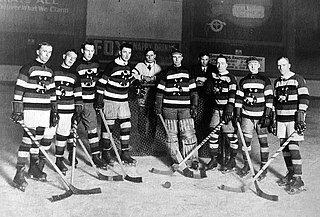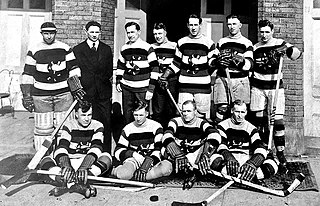The 1917–18 NHL season was the first season of the National Hockey League (NHL) professional ice hockey league. The league was formed after the suspension of the National Hockey Association (NHA). Play was held in two halves, December 19 to February 4, and February 6 to March 6. The Canadiens won the first half, and Toronto the second half. The season was contested by four teams, down from six in the previous season, finishing with only three, in Montreal, Ottawa and Toronto. The Montreal Wanderers withdrew early in January 1918 after their rink, the Westmount Arena, burned down. Toronto won the NHL playoff and then won the Stanley Cup, by defeating the PCHA's Vancouver Millionaires three games to two in a best-of-five series.
The Seattle Metropolitans were a professional ice hockey team based in Seattle, Washington, playing in the Pacific Coast Hockey Association (PCHA) from 1915 to 1924. During their nine seasons, the Metropolitans were the PCHA's most successful franchise, as they went 112–96–2 in their nine years as a franchise. The Metropolitans also won the most regular season PCHA championships, winning five times, with Seattle finishing second on three other occasions. The Metropolitans played their home games at the 2,500 seat Seattle Ice Arena located downtown at 5th and University.
The 1919–20 NHL season was the third season of the National Hockey League (NHL). A Quebec team was activated by the NHL, increasing the number of teams to four. The four teams played 24 games in a split-schedule format. The Ottawa Senators won the league championship by winning both halves of the split-season. The Senators went on to win the Stanley Cup for the first time since the Cup challenge era ended and their eighth time overall, by defeating the PCHA's Seattle Metropolitans three games to two in a best-of-five series in the Stanley Cup Finals.

Bernard Patrick Morris was a Canadian professional ice hockey player. He played for the Seattle Metropolitans of the Pacific Coast Hockey Association (PCHA) from 1915 to 1923. When the Metropolitans became the first U.S.-based team to win the Stanley Cup in 1917, Morris scored 14 of Seattle's goals. Morris also played for the Calgary Tigers, Boston Bruins, and various minor league teams.
The 1923–24 NHL season was the seventh season of the National Hockey League. Four teams each played 24 games. The league champions were the Montreal Canadiens, who defeated the first-place Ottawa Senators in the league playoff. The Canadiens then defeated the Calgary Tigers of the Western Canada Hockey League (WCHL) and Vancouver Maroons of the Pacific Coast Hockey Association (PCHA) to win their second Stanley Cup championship.

Frank Corbett "Flash" Foyston was a Canadian professional ice hockey player and coach. Foyston was a member of Stanley Cup championship teams three times: with the Toronto Blueshirts in 1914, the Seattle Metropolitans in 1917, and the Victoria Cougars in 1925. While with the Metropolitans, he twice led the Pacific Coast Hockey Association (PCHA) in goals. After his retirement from playing, Foyston became a minor league head coach. He was inducted into the Hockey Hall of Fame in 1958.

John Phillip "Jack" Walker was a Canadian professional ice hockey forward who played for the Toronto Blueshirts, Seattle Metropolitans, Victoria Cougars, and Detroit Cougars. He played in all the big professional leagues at the time: the National Hockey Association (NHA), Pacific Coast Hockey Association (PCHA), Western Canada Hockey League (WCHL), and National Hockey League (NHL).
The 1911–12 NHA season was the third season of the National Hockey Association (NHA). Four teams played 18 games each. The Quebec Bulldogs would win the league championship and take over the Stanley Cup.

Carol William "Cully" Wilson was an Icelandic-Canadian professional ice hockey player. The right winger played in the National Hockey League (NHL) for the Toronto St. Pats, Montreal Canadiens, Hamilton Tigers, and Chicago Black Hawks between 1919 and 1927. He was also a member of two teams that won the Stanley Cup before the NHL came into existence in 1917, the Toronto Blueshirts and Seattle Metropolitans.
The 1917 Stanley Cup Finals was contested by the Pacific Coast Hockey Association (PCHA) champion Seattle Metropolitans and the National Hockey Association (NHA) and Stanley Cup defending champion Montreal Canadiens. Seattle defeated Montreal three games to one in a best-of-five game series to become the first team from the United States to win the Cup. The series was also the first Stanley Cup Finals to be played in the United States, and the last Stanley Cup Finals to not feature a National Hockey League team, as the NHA rebranded as the NHL in November 1917.
The 1920 Stanley Cup Finals was contested by the National Hockey League (NHL) champion Ottawa Senators and the Pacific Coast Hockey Association (PCHA) champion Seattle Metropolitans. The Senators won the series by three games to two in the best-of-five game series. Although all of the games for the series were scheduled to be played at The Arena in Ottawa, unseasonably warm weather and poor ice conditions forced the last two contests to be played on the artificial ice at Toronto's Arena Gardens.
The 1925 Stanley Cup Finals saw the Western Canada Hockey League (WCHL) champion Victoria Cougars defeat the National Hockey League (NHL) champion Montreal Canadiens three games to one in a best-of-five game series. The Canadiens were substitute NHL representatives, as the final series to decide the NHL champion was not played.
The 1924 Stanley Cup playoffs was the third and final year in which the National Hockey League (NHL) champions, the Pacific Coast Hockey Association (PCHA) champions, and the Western Canada Hockey League (WCHL) champions all competed for the Stanley Cup. The playoffs began on March 18, 1924, and concluded on March 25 when the NHL champion Montreal Canadiens defeated the WCHL champion Calgary Tigers in the final series, two games to zero.

The 1913–14 NHA season was the fifth season of the National Hockey Association (NHA). At the end of the regular season, a tie for first place necessitated a playoff to determine the championship. The Toronto Hockey Club defeated the Montreal Canadiens 6–2 in a two-game, total-goals playoff. The Torontos then played the Victoria Aristocrats of the Pacific Coast Hockey Association (PCHA) in the first Stanley Cup 'World's Series' between the leagues.
The 1919–20 Ottawa Senators season was the club's 35th season of play and third season in the NHL. It was a very successful season, as they set an NHL record for wins (19), points (38), and won both halves of the season, therefore the Sens automatically were awarded the NHL championship and the right to play in the Stanley Cup Finals. The Senators defeated Seattle to win their eighth Stanley Cup title.
The 1915–16 PCHA season was the fifth season of the professional men's ice hockey Pacific Coast Hockey Association league. Season play ran from December 7, 1915, until February 25, 1916. Each team would play 18 games. The Portland Rosebuds club would be PCHA champions. After the season the club would play the Stanley Cup Finals series against the Montreal Canadiens, NHA champions. Montreal would win the best-of-five series 3–2 to win the Cup.

The 1919 PCHA season was the eighth season of the professional men's ice hockey Pacific Coast Hockey Association league. Season play ran from January 1 to March 10. The season was increased to 20 games per team.

The 1919–20 PCHA season was the ninth season of the professional men's ice hockey Pacific Coast Hockey Association (PCHA) league. Season play ran from December 26, 1919, to March 10, 1920. The season was enlarged to 22 games per team. The Seattle Metropolitans club finished first during the regular season and then won the playoff with the Vancouver Millionaires to take the PCHA championship. The Mets then played in the 1920 Stanley Cup Finals against the National Hockey League (NHL) champion Ottawa Senators. The Senators won the best-of-five series three games to two.
The 1914 Stanley Cup Finals was a series between the Victoria Aristocrats, champions of the Pacific Coast Hockey Association (PCHA), and the Toronto Hockey Club, champions of the National Hockey Association (NHA). The Torontos defeated the Aristocrats in three games to win the best-of-five series. It was the first officially sanctioned series for the Stanley Cup between the two leagues, starting the "World's Series" era where the NHL champion played off against a PCHA or Western league champion annually for the Stanley Cup. It was also the final series of the "challenge" era, where inter-league series for the Stanley Cup were sanctioned by the Stanley Cup trustees. An anticipated follow-on challenge series between Toronto and Sydney, champions of the Maritime League did not take place as Sydney abandoned their challenge for the Cup.












